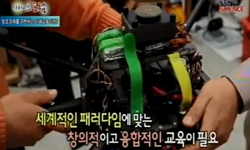Readers of Torah were the exiled in diaspora communities. In exile, they repented their past and rethought the regime of Davidic empire. Their encountering with Yahweh helped them to build a new theology for their future life. They came to confess the...
http://chineseinput.net/에서 pinyin(병음)방식으로 중국어를 변환할 수 있습니다.
변환된 중국어를 복사하여 사용하시면 됩니다.
- 中文 을 입력하시려면 zhongwen을 입력하시고 space를누르시면됩니다.
- 北京 을 입력하시려면 beijing을 입력하시고 space를 누르시면 됩니다.
https://www.riss.kr/link?id=A76369957
- 저자
- 발행기관
- 학술지명
- 권호사항
-
발행연도
2007
-
작성언어
Korean
- 주제어
-
KDC
230
-
등재정보
KCI등재
-
자료형태
학술저널
-
수록면
37-74(38쪽)
- 제공처
- 소장기관
-
0
상세조회 -
0
다운로드
부가정보
다국어 초록 (Multilingual Abstract)
Readers of Torah were the exiled in diaspora communities. In exile, they repented their past and rethought the regime of Davidic empire. Their encountering with Yahweh helped them to build a new theology for their future life. They came to confess themselves not as the people of king but as one of God. They recognised themselves as the very Minjung, who had long been suffered from the slavery system in the Ancient Near East.
Rejecting the world view of the empire, they declared the new and true one that Yahweh is the Creator of the world. Yahweh created the world not by means of any violence but by means of his words. This means that every empire based on violence is destined to be dismissed by His word. Far from arrogance of gods in the hierarchy of pantheon, God the Creator is humble, as shown in the way of creating Adam through puting His breath into the dust from earth, the humblest material. For this reason, Yahweh is the holy God, apart from any god in the pantheon.
Prohibiting every war and violence, Yahweh has commanded his people to preserve the creation in good state and not to shed any blood on the earth. The earth looks forward to making herself arrogantly enhanced upto heaven, as shown by the empire of Babylon (Gen. 11) and Egypt (Ex. 1). The human being created in accordance with God's image has been blessed to be fruitful and multiplying and filling the earth by the way of pressing down the earth (???) and ruling (???) the creation in order to make the earth humbled (Gen. 1:28). Despite his commission, man transgressed the divine prohibition of eating anything 'from the tree of knowledge of good and evil' and finally fell down. He was expelled out of the garden in Eden to serve the dust from earth which is his own physical material (Gen. 3:23; 4:2). The transgression evoked ego-centred person in Cain and resulted in Cain's murder of Abel, which means man's failure to rule the earth (???, Gen. 4:7).
The extremity of human violence on the earth (Gen. 6:1-4) called the Deluge unavoidably to sweep away all the creatures on the earth in the days of Noah. Relenting his violence, God renewed the covenant with Noah so that the creation could be kept in beautiful state (Gen. 9; cf. the repetition of the word ??? in Gen. 1). In proportion to the increase of human sin, even animal food was allowed to man (Gen. 9:3), although human diet had been limited within vegetable since the initial days of creation (Gen. 1:29).
The human corruption accompanied city civilization with castles and towers. Every empire enforced her people to follow royal religions and to be subjected to governing power. However, the diaspora community refused to accept such an enforced idolatry which was committed in the cults of empiric temples. Royal castles and temples demanded huge amount of stony production from quarries, of metal goods from mines, agricultural goods from fields and of timber from forests. All the stony production could be represented by the word, ??? (Ex.20:4), and every kinds of metal goods could be done by the word, ???? (Ex.34:17). Their refusal of idolatry connoted their absolute negation of slavery system in empire, under which slaves were compelled to produce every kinds of empiric goods from quarries, mines, fields, and forests. These slavery system are represented by divine images, ??? and ????. In this context, the diaspora communities pronounced the Decalogue and the Book of Covenant as the platform for Kingdom of God.
The high ranked people in the empire lived in their castles without any working by hand. They exercised every skill of war and violence all the time. In contrast, Minjung in diaspora yearned after peace and justice. Minjung dreamt of a new city which is totally different from the present one of violence. Such a city of peace and justice could be benefited only by the divine grace. Therefore, fulfillment of the dream is impossible without encountering with God Himself.
The way of
목차 (Table of Contents)
- 들어가는 말
- 1. 토라의 민중: 말씀을 듣고 배우는 디아스포라 공동체
- 2. 세계관의 대결: 민중의 창조신앙
- 3. 우상숭배금지령: 식민지 민중의 저항
- 4. 도성문명과 대결하는 평화운동: 식민지 민중의 지향
- 들어가는 말
- 1. 토라의 민중: 말씀을 듣고 배우는 디아스포라 공동체
- 2. 세계관의 대결: 민중의 창조신앙
- 3. 우상숭배금지령: 식민지 민중의 저항
- 4. 도성문명과 대결하는 평화운동: 식민지 민중의 지향
- 5. 영생에 이르는 길: 식민지 민중의 희망
- 나가는 말
- 참고문헌
- Abstract
동일학술지(권/호) 다른 논문
-
- 한신대학교 한신신학연구소
- 채수일
- 2007
- KCI등재
-
위로하라, 위로하라, 내 백성을 위로하라 : 이사야 40-55장에 나타난 예언자의 신학
- 한신대학교 한신신학연구소
- 이영미(Lee Yeong-mee)
- 2007
- KCI등재
-
- 한신대학교 한신신학연구소
- 홍경원(Hong Kyung-won)
- 2007
- KCI등재
-
- 한신대학교 한신신학연구소
- 김상기(Kim Sang-kee)
- 2007
- KCI등재





 DBpia
DBpia







